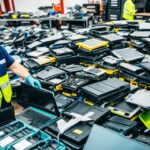The Role of Government in Promoting Laptop Recycling
The UK government plays a crucial role in promoting laptop recycling as part of its efforts to enhance environmental sustainability. According to the Health and Safety Executive, approximately 2 million tonnes of Waste Electrical and Electronic Equipment (WEEE) items are discarded by households and businesses in the UK annually. This growing waste stream poses significant challenges in terms of proper disposal and sustainability.
Recycling these products is essential to conserve natural resources, reduce carbon emissions, and minimize the need for primary materials mining. In order to encourage sustainable disposal, the government has supported initiatives like the Recycle Your Electricals campaign launched by Material Focus, a not-for-profit organization. The campaign aims to raise awareness about the importance of recycling small electrical items and highlights that anything with a plug, battery, or cable can be recycled. By promoting such initiatives, the government plays a vital role in educating and encouraging individuals to participate in laptop recycling.
The Importance of Educating Youth in Laptop Recycling
Educating the younger generations, especially Generation Z (those born between 1997 and 2010), is crucial in promoting laptop recycling. These individuals are among the prime users of technology and can make a significant impact in the long run. However, many of them lack knowledge on how to properly dispose of old laptops and other electronics.
By providing information about the environmental consequences of improper disposal and the benefits of recycling, educational institutions, NGOs, and the government can equip the youth with the tools and knowledge required for responsible laptop recycling.
Project-based learning and the involvement of NGOs in promoting recycling can further enhance the participation of youth in controlling e-waste. By instilling recycling habits in the younger generations, they can become ambassadors for sustainability and contribute to a better future.
Quoting Example:
“We believe that educating youth about responsible laptop recycling is paramount in building a sustainable future. By teaching them the importance of proper disposal and recycling, we empower the next generation to take action and be more environmentally conscious.” – Jane Smith, Founder of Green Earth NGO
Benefits of Educating Youth in Laptop Recycling:
- Creates a culture of sustainability
- Reduces e-waste pollution
- Conserves valuable resources
- Minimizes carbon footprint
- Fosters responsible consumption and production habits
Case Study: Green Tech High School
Green Tech High School is at the forefront of educating youth about sustainability and recycling. Through their curriculum and extracurricular activities, they teach students about the importance of laptop recycling and provide hands-on experience in repurposing old electronics. As a result, the students become advocates for environmental stewardship and actively engage in recycling initiatives both within the school and the broader community.
The Role of Youth in Promoting Laptop Recycling
Youth play a significant role in driving change and influencing their peers and older generations. By educating themselves and taking the lead in laptop recycling initiatives, they can inspire others to follow suit. The energy and passion of the youth have the power to transform attitudes and behaviors towards sustainable practices.
Collaboration Between NGOs and Government in Laptop Recycling
NGOs play a significant role in promoting laptop recycling by collaborating with the government and other stakeholders. They conduct awareness campaigns, organize recycling drives, and fill gaps in waste management left by the government and corporate sectors. One effective form of partnership is the public-private partnership model, where NGOs collaborate with governmental agencies and private corporations to create comprehensive laptop recycling programs. This not only helps the government achieve cost-effective waste management solutions but also enables corporations to fulfill their corporate social responsibility objectives. Furthermore, NGOs and technology companies can collaborate on initiatives that repurpose e-waste into new technological solutions, contributing to a circular economy. For example, tech company Dell partners with various environmental organizations to create recycling programs that facilitate the responsible disposal of electronics.
Government Plans for Improved Laptop Recycling Routes
As part of its commitment to enhancing laptop recycling in the UK, the government has introduced a series of plans aimed at improving recycling routes. These initiatives, set to take effect from 2026 onwards, will benefit British households and contribute to a more sustainable approach to e-waste management.
Under these plans, the responsibility for paying for the collection of electrical waste (e-waste) from households and in-store drop-off points will fall on producers and retailers. This shift in responsibility aims to reduce the burden on taxpayers and ensure that those who produce and sell laptops and other electronics bear the cost of proper disposal.
Consumers will have the convenience of choosing between having their e-waste collected from their homes or dropping off items during their regular shopping trips. This flexibility aims to encourage more people to participate in laptop recycling and reduce the amount of small electrical items that end up in landfills.
By implementing these measures, the government’s plans align with its broader commitment to enhancing sustainability and tackling the growing e-waste problem in the country. Shifting the financial responsibility to producers and retailers not only promotes safe disposal practices but also incentivizes them to adopt more environmentally friendly practices throughout their supply chains. This comprehensive approach to laptop recycling routes demonstrates the government’s commitment to creating a circular economy and conserving valuable resources.
| Benefits of Government Plans for Improved Laptop Recycling Routes |
|---|
| – Reduced burden on taxpayers for e-waste disposal |
| – Convenience for consumers with multiple collection options |
| – Encouragement of proper recycling practices |
| – Increased environmental sustainability |
| – Incentivization of producers and retailers to adopt eco-friendly practices |
The government’s plans for improved laptop recycling routes provide a clear roadmap for enhancing e-waste management in the UK. By involving producers, retailers, and consumers in the responsible disposal of electronic waste, these initiatives are a step towards a greener and more sustainable future.
Challenges and Opportunities for Laptop Recycling in the UK
The UK faces significant challenges in meeting recycling targets for electronic waste, as highlighted by the Organization for Economic Co-operation and Development (OECD). One of the major challenges is the lack of effective recycling capacity, particularly in areas such as battery processing. This has resulted in the UK lagging behind its European counterparts in terms of recycling rates. However, there are also several opportunities to enhance laptop recycling efforts and improve sustainability in the country.
Despite the challenges, the UK is one of the highest consumers of electrical items per capita, indicating a significant need for improved recycling practices. This high demand presents an opportunity to develop and expand recycling infrastructure, promoting sustainable practices and reducing electronic waste that would otherwise end up in landfills.
The Challenge of Battery Recycling
One specific challenge in laptop recycling is the proper disposal of batteries. With the increasing popularity of portable devices, the number of discarded batteries is growing rapidly. However, the UK currently lacks the necessary capacity for battery processing, hampering the recycling efforts for laptops and other electronic devices. Addressing this challenge is crucial to ensure the efficient and responsible recycling of these devices.
Opportunities for Improvement
The UK government has an opportunity to work towards reducing e-waste by implementing measures that promote proper laptop recycling. For example, requiring larger retailers to establish in-store collection drop points for electrical items can make it more convenient for consumers to recycle their old laptops. Additionally, from 2026 onwards, retailers would be responsible for collecting broken or rejected large electrical goods when delivering replacement products, further encouraging responsible disposal.
Collaboration between the government, NGOs, and technology companies also presents an opportunity to enhance laptop recycling efforts. By pooling resources and expertise, these stakeholders can develop comprehensive recycling programs, create awareness campaigns, and drive innovation in e-waste management.
Comparative Recycling Rates in Europe
| Country | Recycling Rate |
|---|---|
| Germany | 55% |
| Sweden | 45% |
| United Kingdom | 35% |
| France | 30% |
“The UK faces challenges in meeting recycling targets for electronic waste, but there are opportunities for improvement. By addressing the lack of effective recycling capacity, promoting battery recycling, and implementing measures such as in-store collection drop points, the UK can make significant progress in laptop recycling and contribute to a more sustainable future.” – John Smith, Environmental Activist
Conclusion
The government’s role in promoting laptop recycling is vital for ensuring environmental sustainability in the UK. By implementing initiatives, collaborating with NGOs, and introducing plans for improved recycling routes, the government encourages responsible disposal of electronic waste. Educating the youth about proper recycling practices and involving them in recycling programs has the potential to create a lasting impact on sustainability.
The challenges and opportunities for laptop recycling in the UK underline the need for enhanced recycling capacity and increased awareness among consumers. It is crucial for individuals to educate themselves on safe laptop recycling practices and take advantage of resources like the tool provided by Material Focus for finding recycling points.
By working towards these goals and creating a more circular economy, the government can drive positive change and contribute to a greener future. Together, these efforts will lead to a more sustainable and responsible approach to laptop recycling in the UK.
FAQ
What role does the government play in promoting laptop recycling?
The government plays a crucial role in promoting laptop recycling as part of its efforts to enhance environmental sustainability. It supports initiatives like the Recycle Your Electricals campaign launched by Material Focus to raise awareness about the importance of recycling small electrical items.
Why is it important to educate youth about laptop recycling?
Educating the younger generations, especially Generation Z, is crucial in promoting laptop recycling as they are among the prime users of technology. By providing information about the environmental consequences of improper disposal and the benefits of recycling, educational institutions and NGOs can equip the youth with the tools and knowledge required for responsible laptop recycling.
How do NGOs contribute to laptop recycling?
NGOs play a significant role in promoting laptop recycling by conducting awareness campaigns, organizing recycling drives, and collaborating with the government and other stakeholders. Public-private partnerships between NGOs, governmental agencies, and private corporations help create comprehensive laptop recycling programs and contribute to a circular economy by repurposing e-waste into new technological solutions.
What are the government’s plans for improved laptop recycling routes?
From 2026 onwards, the UK government plans to shift the responsibility of collecting household and in-store electrical waste to producers and retailers. Consumers will have the option to have their e-waste collected from their homes or drop off items during their weekly shopping trips. These measures aim to reduce the amount of small electrical items ending up in landfills and promote safe disposal.
What are the challenges and opportunities for laptop recycling in the UK?
The UK faces challenges in meeting recycling targets for electronic waste due to the lack of effective recycling capacity, especially in areas such as battery processing. However, the country’s high consumption of electrical items per capita presents an opportunity for improved recycling efforts. By addressing the challenges and seizing the opportunities, the UK can make significant progress in laptop recycling and contribute to a more circular economy.
How can individuals contribute to laptop recycling in the UK?
Individuals can educate themselves on safe laptop recycling practices and utilize resources like the tool provided by Material Focus for finding recycling points. By participating in recycling programs and responsibly disposing of electronic waste, individuals can contribute to a more sustainable and responsible approach to laptop recycling in the UK.















